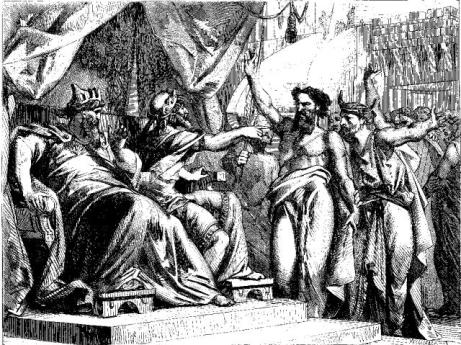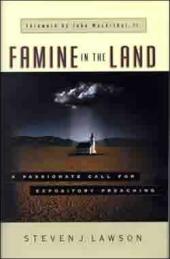
The apostle Paul, preaching to the pastors of Ephesus, sharing with them their responsibilities after his departure, gave instructions on how pastors are to be watchmen (Acts 20:25-31).
Pastors have the responsibility to be heralds (Acts 20:25) – the word preaching means “to declare a message as the herald of the king.” The herald tells what the king tells him to declare. He is a man commissioned and sent with a message – the message of the king – and he must not change that message in any way.
The herald is not responsible to manufacture or manipulate the message – his sole responsibility is to declare it just as the king said it. And since he is sent by the king, the people who listen had better be careful how they treat both the messenger and the message.
Pastors have the responsibility to be watchmen (Acts 20:26) – what a serious calling it is to be a watchman. Souls are at stake and God holds the watchman accountable (Ezekiel 3:17-21) and this is what Paul was referring to.
How to be a faithful watchman (Acts 20:27-31)
The faithful watchman declares the whole purpose of God (Acts 20:27). Preaching the whole counsel or purpose of God includes preaching sound doctrine and not strange doctrine; all doctrine and not just positive doctrine;
truth that hurts and then heals and not falsehood that comforts and then kills. It is not love and it is not friendship and it is not faithfulness if we fail to proclaim the whole counsel of God.The faithful watchman guards himself and the flock (Acts 20:28). The watchman has to stand guard, ready to sound the alarm if he sees danger approaching (28a). The watchman guards himself through self-examination – “
paying close attention to himself and to his teaching” (1 Timothy 4:16a). He has to examine his life and doctrine to make sure that both honor God and that he is in right relationship with God.
The watchman guards all the flock through declaring the whole counsel/purpose of God and paying attention to what teachings they are feeding on (see 1 Timothy 4).
The watchman has to be faithful not fearful, thinking not only of himself but also of others, and above all serving as a good soldier of Christ who placed him at that post through the Holy Spirit (28b) –
the watchman does not choose the post but is appointed to the post – “
among which the Holy Spirit has made you overseers.” Think about it – God places His watchmen in a position so that they can see danger and then warn others. God requires of the watchman that he climb to higher ground so that he can be an effective overseer able to spot danger from miles away. That higher ground for the watchman is the high and holy hill of the Word of God.
A word of warning – the church is not to give “blind” allegiance to pastors – they are to search the Scriptures to see whether or not what they are teaching is so and devote themselves to that teaching respecting and obeying their leaders.
But on the other hand the church is not to rebel against pastoral leadership with the attitude of “equality of ability.” In other words it is the attitude of “we’re all Christians and we can all see for ourselves so we don’t need an overseer and if you think that we do then you are exalting yourself above the assembly of the Lord. This is one of the marks of ungodly, unregenerate, counterfeit-Christians (see Numbers 16:1-3 and Jude 11-16).
The true pastor doesn’t make himself an overseer – he is chosen and made an overseer by the Holy Spirit (28b) and to rebel against that is to rebel against, despise, and reject God-given and God-established authority.
The watchman is not only to guard by being an overseer, he is also to guard by being a shepherd/pastor (28c). One of the primary tasks of shepherds is that of feeding the sheep. The sheep must be fed good food and kept from both poisonous weeds and barren fields. In order to feed the sheep the shepherd must lead the sheep to green pastures. This brings us all the way back to the watchman’s responsibility to be in right relationship with God. The pastor is the under-shepherd who is to walk closely with the Great-Shepherd who will lead him and the rest of the sheep into green pastures and beside still waters.
The church of God is not led to green pastures through topical, self-help, meet-your-needs sermons and “good ole boy stories”. Those are barren fields and poisonous weeds fit only for goats.
Notice how important the task of being a faithful watchman is – the watchman is made overseer by the Holy Spirit to shepherd the church of God which He purchased with His own blood! The church of God is made up of people who are not their own but have been bought with a price and is to be pure and holy and healthy for God and His glory!The faithful watchman guards against dangers from the outside (Acts 20:29). This is one reason he is called watchman, overseer, shepherd – he takes his stand on higher ground and watches for dangerous intruders. Savage wolves are false teachers and false prophets – Jesus said, “Beware of the false prophets who come to you in sheep’s clothing but inwardly are ravenous wolves” (Matthew 7:15).
It is even more difficult today for pastors to guard against savage wolves because their false teachings are televised, published, marketed, and spread through all sorts of media. And even so there is the danger of people coming in from the outside into positions of leadership who are actually false teachers. Let a pastor be motivated by his desire to “grow the church” rather than the command to “guard the church” and he will soon open the door for false teachers to come in.
The faithful watchman will not allow false teachers with their destructive heresies unguarded entrance among God’s people.The faithful watchman guards against dangers from the inside (Acts 20:30). This is probably the hardest to accept –
that from among your own selves men will arise, speaking perverse things, to draw away the disciples after them. Perverse means to distort or twist. False teachers twist God’s Word and try to get others to follow them and “their way of seeing things.” Not only do those who pose dangers from the outside need to be marked out but also those who pose dangers from the inside. In 1 Timothy 1:18-20, Paul writing to Timothy who was the pastor at Ephesus marked out two men who had risen from among them and were speaking perverse things calling them by name.
The faithful watchman watches or is alert all the time (Acts 20:31) – he must guard against dangers from the outside and from the inside and it is a night and day responsibility. “
I passed by the field of the sluggard and by the vineyard of the man lacking sense, and behold, it was completely overgrown with thistles; its surface was covered with nettles, and its stone wall was broken down. When I say, I reflected upon it; I looked, and received instruction. ‘A little sleep, a little slumber, a little folding of the hands to rest,’ then your poverty will come as a robber and your want like an armed man” (Proverbs 24:30-34). The faithful watchman cannot afford to sleep or slumber – he must be alert all the time.
The faithful watchman warns/admonishes (31b) – admonish refers to giving counsel with a warning involved. The pattern of Paul’s ministry shows the importance of warning believers about false teachers. He admonished the Ephesians night and day for a period of three years with tears.
This passage highlights the importance of warning believers about false teachers. 1 Timothy 4:6 refers back to the first five verses which speaks of the deceitful spirits and doctrines of demons that the false teachers would use to deceive men and verse six says, “
In pointing out these things to the brethren, you will be a good servant of Christ Jesus, constantly nourished on the words of the faith and of the sound doctrine which you have been following."
He is no faithful watchman or good servant of Christ Jesus who does not warn against false teachers and their teachings. Unfortunately there are many unfaithful watchmen today who are asleep at their post and false teachers with their destructive heresies have unguarded entrance and access among God’s people.
 There are at least two problems with truth for those who despise, disdain, and reject it and one problem with truth for those who love, receive, and proclaim it: for those who despise, disdain, and reject truth, it is too clear and too convicting. For those who love, receive, and proclaim truth, it is costly. "But when they heard this, they were cut to the quick and intended to kill them" (Acts 5:33).
There are at least two problems with truth for those who despise, disdain, and reject it and one problem with truth for those who love, receive, and proclaim it: for those who despise, disdain, and reject truth, it is too clear and too convicting. For those who love, receive, and proclaim truth, it is costly. "But when they heard this, they were cut to the quick and intended to kill them" (Acts 5:33).



